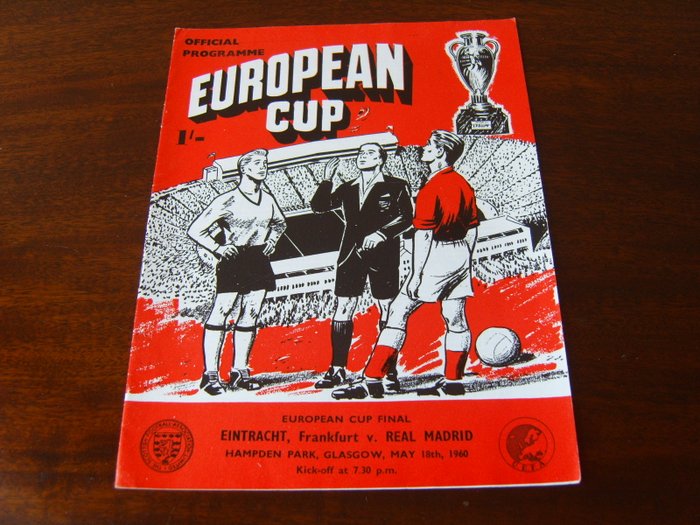May 18th 1960 was the day of the FIRST European Cup Final, as it was known then. This was the European Club competition, for clubs that have won their Nations' Top League. Now known as the UEFA Champions League.
In this case it was Real Madrid from Spain and Eintracht Frankfurt from West Germany, who played out the final at Hampden Park in Scotland. There was a crowd of over 127,000, enabled by the space available in the massive old stadium in Glasgow. The stadium has since been modernised (Hampden not Glasgow) and hence it's capacity reduced. A large TV audience, estimated at 70 million +, witnessed the game.
I watched the game in black and white on the family TV, a very small one. The game was a bit of a mystery to me since, at 9 years old, I had not yet mastered the concept of the European Cup nor the technical issues associated with an old TV set. I was aware of one or two Real players, but no Frankfurt players.
I was able to share 10 goals with the rest of the viewing public; Real Madrid won 7-3.
I have a copy of the programme.
Real Madrid had dominated the European Cup during the first five years from 1956-60.
To get to the finals both teams had to beat three teams only, home and away:
RM: Jeunesse Esch, Nice and Barca.
EF: Young Boys, Wiener-Sports Club, and Glasgow Rangers (a 12-4 aggregate in this tie).
Madrid's dominance over the early years of the competition, ended in 1961, when national rivals, Barcelona, beat them in qualifying. They then lost to Benfica from Portugal and it was not until 1967 that a non-Latin club were champions; it was Celtic that broke the strong hold.
Ferenc Puskas of Real Madrid, the Hungarian "Galloping Major", who had recently served in his national army, had accused the West German national team of taking drugs during the 1954 World Cup finals. The Germans, understandably, banned their teams from playing against any team involving Puskas. However, he had to make a written apology to the West German FA before being "allowed" to play in the final.
To get his own back, Puskas scored four goals in the final and Alfredo di Stefano (an Argentine player), topped it off with a hat trick. Jack Mowat from Scotland reffed the game at the ripe old age of 52.
English champions Chelsea initially agreed to compete and were drawn against Swedish side Djurgården; however, under pressure from The Football League, who saw the tournament as a distraction to domestic football, they later withdrew from the competition.
Despite only finishing fifth in the Scottish League in 1955, Hibs were invited to participate in the first season of the European Cup, which was not strictly based on league positions at that time. Eighteen clubs who were thought would generate interest across Europe and who also had the floodlights necessary to play games at night, were invited to participate. Floodlights had been used at Easter Road for the first time in a friendly match against Hearts on 18 October 1954. Hibs became the first British club in Europe because the Football League secretary Alan Hardaker persuaded Chelsea, the English Champions, not to enter.
Hibs played their first tie against Rot-Weiss Essen, winning 4–0 in the Georg-Mecher Stadium and drawing 1–1 at Easter Road. They defeated Djurgardens IF to reach the semi-final, but in that tie they were defeated 3–0 on aggregate by Stade Reims, who had the famous French international player Raymond Kopa in their side. Reims lost 4–3 to Real Madrid in the Final.
On this day, in 1970, Bobby Moore was accused of theft in Bogota, before the World Cup Finals in Mexico. It looked to be "sabotage" by somebody in South America!




No comments:
Post a Comment